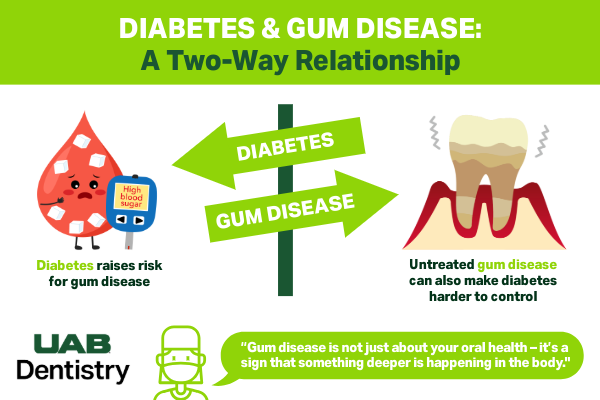 Gum disease and diabetes are more connected than you think. Understanding this link is key to preventing serious health issues.
Gum disease and diabetes are more connected than you think. Understanding this link is key to preventing serious health issues.
If you have diabetes, you probably know how important it is to manage your blood sugar. But what many patients don’t realize is that gum disease is one of the most common – and preventable – complications of diabetes.
High blood glucose increases inflammation and results in weaker response to infection – and that includes infections of the gums and bone.
According to the American Diabetes Association, when sugar levels are high, your saliva contains more glucose and less protective power, which creates the perfect environment for bacteria and plaque buildup. These changes in oral bacteria in combination with increased inflammation throughout the body can lead to the development of gum disease – including destruction of hard and soft tissues around teeth.
“Early symptoms of gum disease include swollen or bleeding gums, loose teeth, persistent bad breath, and receding gum lines,” said Mia Geisinger, D.D.S., M.S., Professor and Acting Chair of the UAB Department of Periodontology and President of the American Academy of Periodontology. “When left untreated, it can progress to periodontitis – a severe infection that damages the bone and tissue holding your teeth in place – which can ultimately lead to tooth loss.”
In fact, the National Institute of Diabetes and Digestive and Kidney Diseases reports that almost 1 in 4 adults over 50 with diabetes experience severe tooth loss.
Not only does diabetes raise your risk for gum infection and tooth loss, but untreated gum disease can also make diabetes harder to control. Geisinger wants patients to understand this two-way relationship and to provide patients with tools to stay ahead of oral and overall health challenges.
“Gum disease is not just about your oral health – it’s a sign that something deeper is happening in the body,” said Geisinger. “We often see that once we address inflammation and infection in the mouth, patients also experience better blood sugar control.”
“At the UAB Dentistry Periodontology Clinic, our providers urge patients to pay close attention to oral health before symptoms turn into serious problems,” Geisinger shared.
Patients with diabetes receive personalized care that includes deep cleanings, risk assessments, and personalized oral home care plans. Our team uses the latest technology – from digital x-rays to 3D imaging – to detect problems early and create treatment strategies that align with your medical needs. These approaches help patients take control of both their oral and systemic health.
“Preventive care is the most powerful tool we have,” said Geisinger. “That includes brushing twice a day, cleaning between your teeth daily, and attending routine dental checkups. Patients should also let their dentist know if they’ve been diagnosed with diabetes, have risk factors for diabetes, or have noticed any symptoms such as dry mouth or mouth sores.” Good oral hygiene and early detection of gum disease can play a critical role in managing diabetes effectively.
If you’re living with diabetes and haven’t seen a periodontist recently, it may be time. Call the UAB Periodontology Clinic at (205) 934-4551 to schedule a consultation and learn more about protecting your oral health – for life.